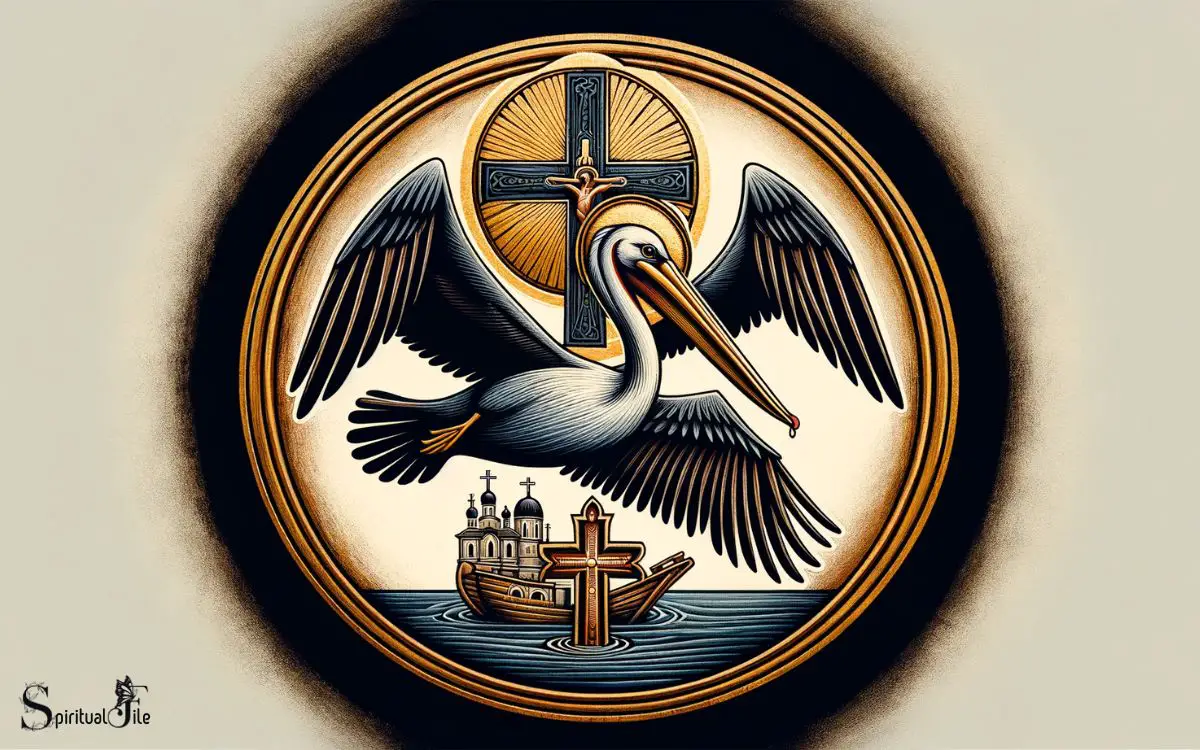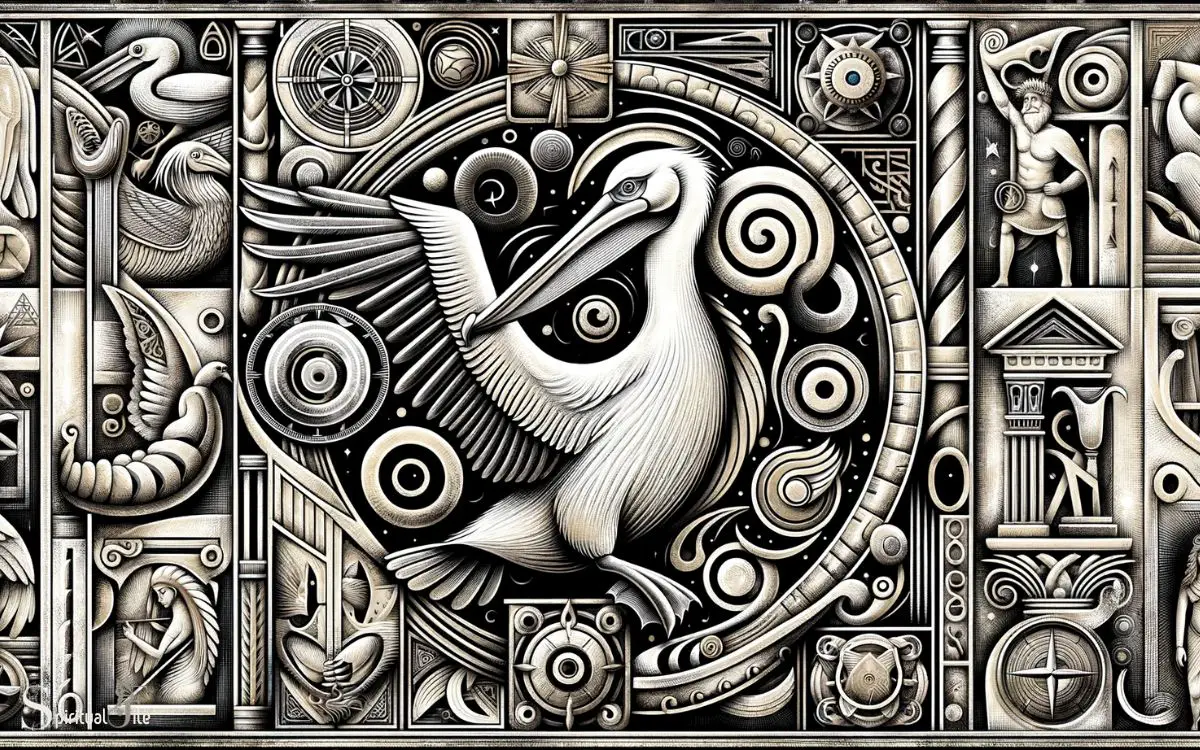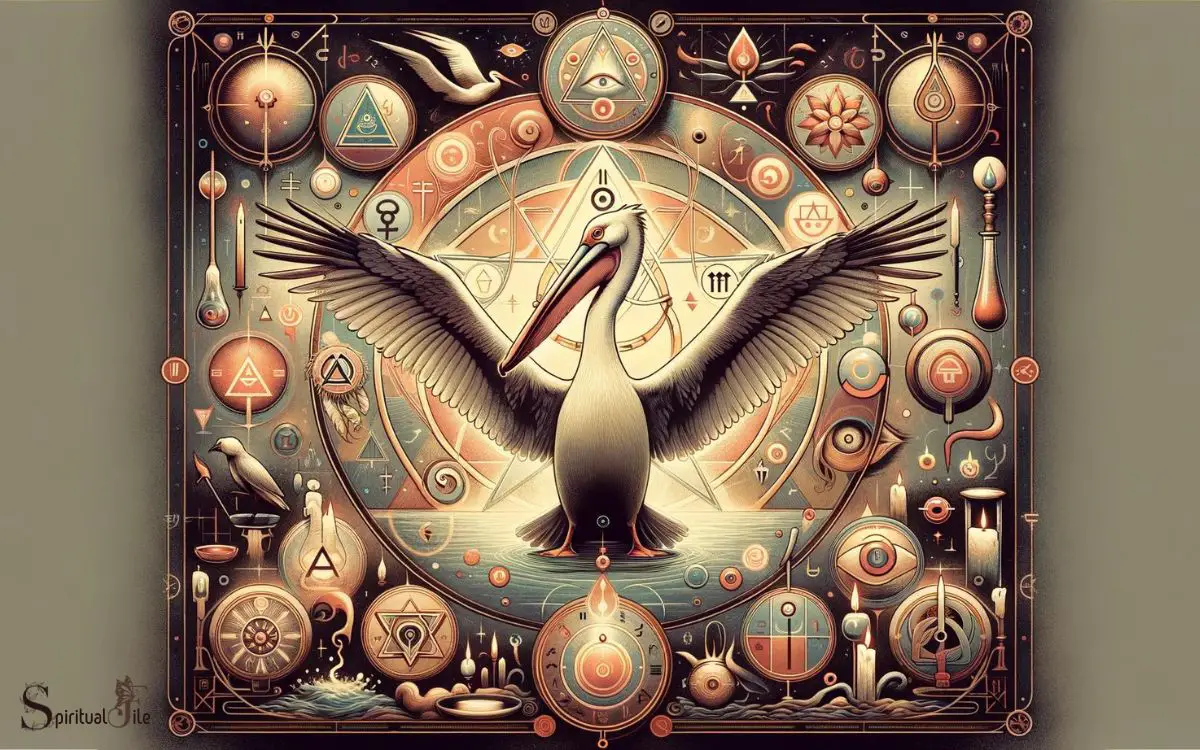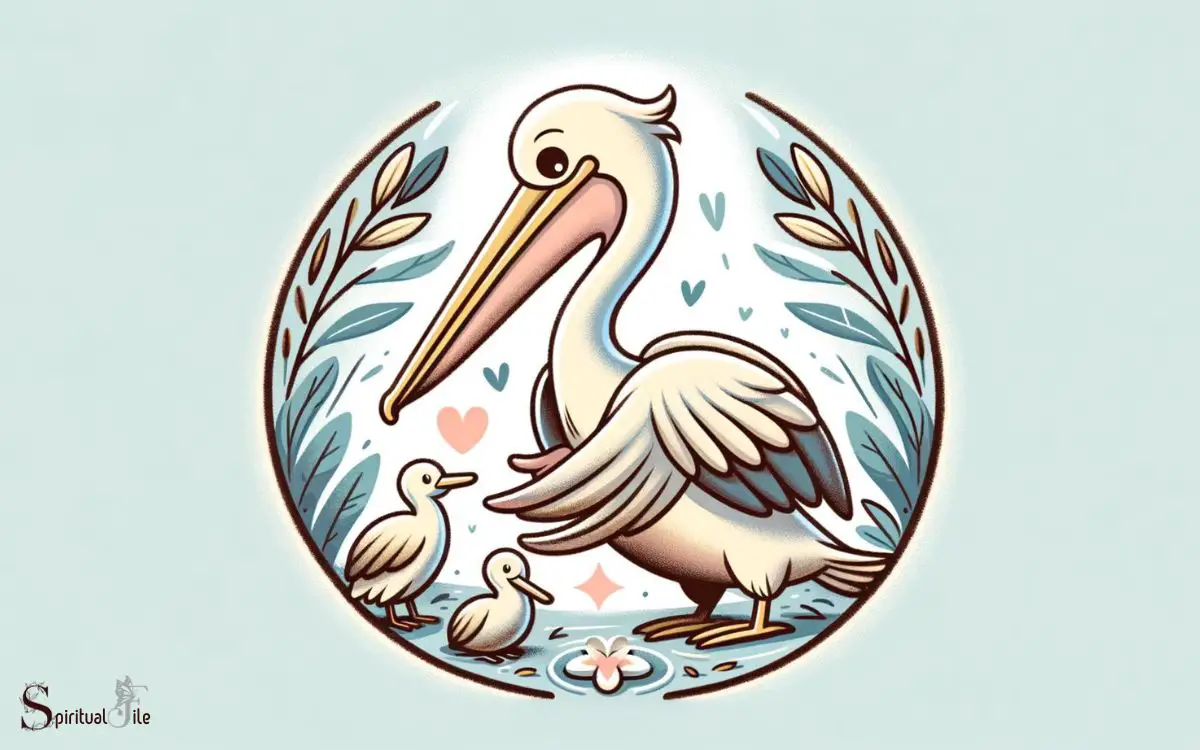What Does a Pelican Symbolize Spiritually? Rebirth!
The pelican symbolizes self-sacrifice, rebirth, and parental care spiritually. It’s often associated with Jesus Christ’s sacrifice and the Eucharist in Christianity.
In other cultures, the pelican represents resilience, abundance, and the importance of community and family. Spiritually, the pelican is a powerful symbol that carries multiple meanings.
For example:
In Christianity, the pelican is often depicted in religious art and literature, representing Jesus Christ’s self-sacrifice for humanity’s salvation.
Moreover, the pelican’s ability to store fish in its large bill pouch is symbolic of abundance and providence, echoing themes of spiritual and emotional nourishment.
The pelican, a beacon of sacrifice and care, guides individuals on a spiritual journey towards embracing the virtues of generosity and resilience, illuminating paths of self-discovery and community connection.

Key Takeaway
Christian Symbolism of the Pelican

How does the pelican symbolize Christian spirituality?
The pelican has been a symbol of Christian spirituality for centuries, representing self-sacrifice and redemption.
According to medieval legend, the pelican was believed to wound itself to feed its young with its blood, thus symbolizing Jesus Christ’s sacrificial act on the cross to save humanity.
This imagery is deeply rooted in Christian theology, portraying Christ’s ultimate sacrifice for the salvation of mankind.
The pelican’s association with nurturing and sustaining life aligns with the Christian belief in the sustenance and spiritual nourishment provided by the body and blood of Christ.
As a result, the pelican has become a powerful emblem in Christian art and literature, embodying the profound spiritual concepts of sacrifice, redemption, and divine love.
Pelican Symbolism in Ancient Mythology

The symbolism of the pelican in ancient mythology is rich and varied. The bird is often depicted as a nurturing deity in various cultures. It holds significance as a sacrificial symbol in the mythology of several ancient civilizations.
Exploring these aspects of pelican symbolism in ancient mythology provides insight into the diverse spiritual and cultural interpretations of this majestic bird.
Pelican as Nurturing Deity
In ancient mythology, the pelican is revered as a nurturing deity, embodying the concept of self-sacrifice and care for others.
This symbolism can be found in various ancient cultures and belief systems, where the pelican is seen as a powerful and benevolent force representing aspects of nurturing and protection.
The pelican’s role as a nurturing deity is deeply ingrained in the spiritual and mythological narratives of different civilizations, emphasizing its significance as a symbol of selflessness and compassion.
- Symbol of Sacrifice: The pelican is often associated with the idea of sacrifice, as it was believed that the bird would pierce its own breast to feed its young with its blood.
- Representation of Nurturing: Ancient myths depict the pelican as a caring and nurturing figure, providing sustenance and protection to those under its care.
- Depiction of Selflessness: The pelican’s willingness to give of itself for the well-being of others serves as a powerful symbol of selflessness and altruism.
- Icon of Divine Care: Across different mythologies, the pelican is revered as a divine being that embodies the virtues of nurturing and compassion.
Pelican as Sacrificial Symbol
Throughout ancient mythology, the pelican is consistently depicted as a sacrificial symbol, embodying the concept of selflessness and benevolence through its nurturing actions and willingness to provide sustenance at its own expense.
In various cultures, the pelican is revered for its willingness to pierce its own breast to feed its young with drops of blood, symbolizing a profound sacrifice for the well-being of others.
This sacrificial symbolism is evident in Egyptian mythology, where the pelican was associated with the afterlife and depicted as an emblem of self-sacrifice.
Similarly, in Christian iconography, the pelican’s act of piercing its breast to feed its young is seen as a representation of Christ’s sacrificial love and care for humanity.
The pelican’s portrayal as a sacrificial symbol in ancient mythology continues to inspire admiration for its altruistic nature and compassionate acts.
The Pelican as a Symbol of Nourishment
As a symbol of nourishment, the pelican represents the provision and sustenance of life in many spiritual traditions.

This symbolism is deeply rooted in the belief that the pelican nourishes its young with its own blood, a concept that has been embraced by various religious and spiritual ideologies.
The pelican as a symbol of nourishment embodies the following aspects:
- Selflessness: The pelican’s act of feeding its young with its own blood is seen as a selfless and sacrificial act, reflecting the concept of self-sacrifice for the well-being of others in spiritual teachings.
- Abundance: The image of the pelican providing sustenance to its offspring signifies the abundance of nourishment and care available in the divine realm.
- Renewal: The act of feeding its young with its blood also symbolizes renewal and the cycle of life, death, and rebirth in spiritual contexts.
- Divine Love: The pelican’s nurturing gesture is often interpreted as a representation of divine love and care for all living beings.
These interpretations highlight the profound spiritual significance of the pelican as a symbol of nourishment.
Pelican Symbolism in Alchemy and Hermeticism

The symbolism of the pelican continues in alchemy and Hermeticism, where it is often used to represent the process of spiritual transformation and the pursuit of higher knowledge.
In alchemical texts and symbolism, the pelican is associated with the concept of transmutation, where base elements are transformed into higher spiritual states.
This mirrors the pelican’s ancient Christian symbolism of sacrificing itself for its offspring, as it represents the sacrifice and personal transformation required to attain spiritual enlightenment.
In Hermeticism, the pelican is also linked to the pursuit of divine wisdom and the alchemical process of inner refinement.
Its representation in these esoteric traditions underscores its enduring significance as a powerful symbol of spiritual evolution and the quest for higher consciousness.
The Pelican as a Symbol of Resilience

The pelican symbolizes resilience in the face of adversity, as it is known for its ability to endure and thrive in harsh conditions.
This symbolism is often associated with the pelican’s act of sacrificing itself to nourish its young, only to be reborn again.
Through its nurturing and selfless nature, the pelican embodies the concept of resilience and the ability to overcome challenges with grace and strength.
Pelican and Adversity
In times of adversity, a pelican exemplifies remarkable resilience and endurance, embodying the unwavering strength to overcome challenges and hardships.
- Adaptability: Pelicans can thrive in various environments, illustrating the ability to adjust to changing circumstances.
- Persistence: These birds display a tenacious spirit, continuing to pursue their goals despite obstacles.
- Community Support: Pelicans often work together in a group, relying on each other for support during challenging times.
- Survival Instinct: Pelicans demonstrate a strong survival instinct, showing the determination to endure and persevere through adversity.
This ability to endure adversity makes the pelican a powerful symbol of resilience, inspiring individuals to face their own challenges with courage and determination.
This resilience ties into the concept of sacrifice and rebirth, which will be explored in the next section.
Sacrifice and Rebirth
Exemplifying remarkable resilience and endurance, the pelican symbolizes sacrifice and rebirth spiritually, embodying the unwavering strength to overcome challenges and hardships.
In Christianity, the pelican is a symbol of self-sacrifice, as it was believed to wound its breast to feed its young with its blood, representing Christ’s sacrificial love.
This act of sacrifice and subsequent rebirth aligns with the spiritual journey of individuals who face adversity and emerge stronger, emphasizing the theme of resilience and the ability to endure and thrive despite difficulties.
The pelican’s representation of sacrifice and rebirth serves as a poignant reminder of the power of resilience in overcoming life’s trials, inspiring individuals to persevere in the face of adversity and emerge renewed.
This resilience ties into the pelican’s symbolism of nurturing and selflessness, as it embodies the capacity to endure and thrive through selfless acts.
Nurturing and Selflessness
Representing resilience and selflessness, the pelican embodies the nurturing spirit through its remarkable acts of sacrifice and devotion.
The symbolism of the pelican as a creature of nurture and selflessness has deep spiritual significance, resonating with various cultures and belief systems.
Here are four key aspects of the pelican’s symbolism in relation to nurturing and selflessness:
- Sacrificial Nature: The pelican’s willingness to harm itself to feed its young is a powerful symbol of sacrifice and selflessness.
- Nurturing Instinct: The pelican’s dedication to caring for its offspring reflects the nurturing and protective instincts often associated with motherhood and parental responsibility.
- Resilience in Adversity: The pelican’s ability to endure hardships and provide for its young even in challenging circumstances serves as a symbol of resilience and perseverance.
- Altruistic Symbol: The pelican’s acts of selflessness and care are seen as an inspiration for humans to exhibit compassion and nurturing behavior towards others.
How Can I Interpret Spiritual Symbolism in Animals?
When it comes to interpreting spiritual symbolism in animals, the platypus holds deep significance. Known for its unique combination of features, the platypus represents intuition and the interconnectedness of all living beings. By observing the behavior and characteristics of the platypus, one can gain insight into the spiritual realm.
Compassionate Symbolism of the Pelican

The compassionate symbolism of the pelican lies in its representation of selflessness and nurturing care.
In Christian iconography, the pelican is often depicted as a symbol of Christ’s sacrificial love, as it was believed that pelicans would pierce their own chests to feed their young with their blood. This act of self-sacrifice has become a powerful symbol of compassion and unconditional love.
| Aspect of Compassion | Symbolism |
|---|---|
| Selflessness | Pelicans’ willingness to sacrifice for their young reflects a selfless nature. |
| Nurturing care | The act of feeding their young with their own blood symbolizes nurturing and protective care. |
| Sacrificial love | The pelican’s sacrifice parallels the concept of Christ’s sacrificial love in Christian symbolism. |
| Unconditional love | The pelican’s actions represent an unconditional and boundless love for its offspring. |
This table explores the symbolism of compassion through pelicans, showcasing selflessness, nurturing care, sacrificial love, and unconditional love.
Conclusion
The symbolism of the pelican is rich and varied, with spiritual significance in Christianity, ancient mythology, alchemy, and compassion.
It represents sacrifice, nourishment, resilience, and compassion, making it a powerful symbol in various spiritual and philosophical traditions.
The pelican’s symbolism continues to captivate and inspire, inviting us to delve deeper into its spiritual significance and the lessons it offers for personal growth and understanding.






